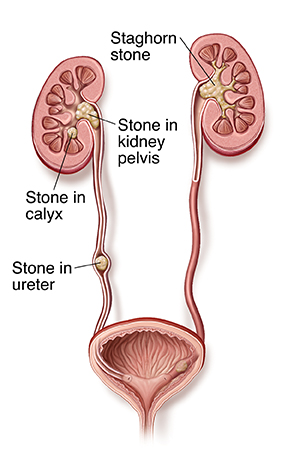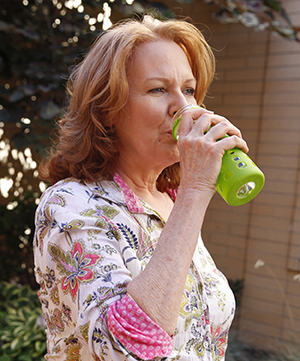Kidney Stones
Understanding Kidney Stones
Your kidneys are bean-shaped organs. They help filter extra salts, waste, and water from your body. You need to drink enough water every day to help flush the extra salts into your urine. Aim for 6 to 8 cups every day. A cup is 8 fluid ounces.
What are kidney stones?
Kidney stones are made up of chemical crystals that separate out from urine. These crystals clump together to make stones. They may stay in the kidney or move into the urinary tract.
Why kidney stones form
Kidneys form stones for many reasons. If you don’t drink enough water, for instance, you won’t have enough urine to dilute chemicals. Then the chemicals may form crystals, which can develop into stones. Here are some reasons why kidney stones form:
- Fluid loss (dehydration). This can concentrate urine, causing stones to form.
- Certain foods. Some foods contain large amounts of the substances that sometimes crystallize into stones. Eating foods that contain a lot of meat or salt can lead to more kidney stones.
- Kidney infections. These infections foster stones by slowing urine flow or changing the acid balance of your urine.
- Family history. If family members have had kidney stones, you’re more likely to have them too.
- A lack of certain substances in your urine. Some substances can help protect you from forming stones. If you don’t have enough of these in your urine, stone formation can increase.
- Other health conditions. Diabetes, gout, cystinuria, and other conditions may increase the risk of kidney stones.
- Certain medicines. Calcium-based antacids, diuretics (water pills), and calcium and vitamin C supplements may increase your risk of forming stones. Do not stop taking any of these medicines unless your health care provider tells you to.
Where stones form
Stones begin in the cup-shaped part of the kidney (calyx). Some stay in the calyx and grow. Others move into the kidney, pelvis, or the ureter. There they can lodge, block the flow of urine, and cause pain.
Symptoms
Many stones cause sudden, severe pain and bloody urine. Others cause upset stomach (nausea). Or they can cause a frequent need to pee or trouble peeing. They may cause a burning feeling when you pee. Symptoms often depend on the stone’s size and location. Fever may be a sign of a serious infection. Call your health care provider right away if you develop a fever.
Preventing Kidney Stones
If you’ve had a kidney stone, you may worry that you’ll have another. Removing or passing your stone doesn’t prevent future stones. But with your health care provider’s help, you can reduce your risk of forming new stones. Follow up with your provider to help find new stones. Depending on your medical condition, you may need to follow up every 3 to 12 months for the rest of your life.
Drink lots of water
Staying well-hydrated is the best way to reduce your risk of future stones. Drink 8 12-ounce glasses of water daily. Have 2 glasses with each meal and 2 glasses between meals. unless your health care provider has restricted your fluids. Keep track of your intake. Try keeping a pitcher of water nearby during the day and at night. Ask your provider about how much fluid you should have if you have congestive heart failure, kidney disease, or kidney failure.
Take medicines if needed
Medicines, including vitamins and minerals, may be prescribed for certain types of stones. You may want to write your doses and medicine times on a calendar. Some medicines decrease stone-forming chemicals in your blood. Others help prevent those chemicals from crystallizing in urine. Still others help keep a normal acid balance in your urine.
Follow your prescribed diet
Your health care provider will tell you which foods contain the compounds you should not have. Your provider may also suggest talking with a dietitian. They can help you plan meals you’ll enjoy that won't put you at risk for future stones. Bring your spouse, partner, or close friend with you when you meet with the dietitian so you can have support for your diet changes.
You may be told to limit certain foods, depending on which type of stones you’ve had. Limit the amount of salt in your food to about 2 grams a day. This will help prevent most types of kidney stones. Make sure you get enough calcium in your diet, and stay away from extra calcium supplements. The recommended calcium intake to help prevent calcium stones is 1,000 to 1,200 mg per day. (You can eat 3 servings of dairy products with meals to meet the recommendation.)
For calcium oxalate stones: Limit animal protein, such as meat, eggs, and fish. Limit grapefruit juice and alcohol. Limit high-oxalate foods (such as cola, tea, chocolate, spinach, rhubarb, wheat bran, and peanuts). Limit sodium intake, because it causes increased leakage of calcium in your urine.
For uric acid stones: Limit high-purine foods, such as red meat, shellfish, anchovies, and organ meats. These foods increase uric acid production. Stay away from alcohol and drinks with high fructose corn syrup. They can increase your risk of forming another kidney stone.
For cystine stones: Limit high-methionine foods. (Fish is the most common, but they include eggs and meats too.) These foods increase production of cystine.

